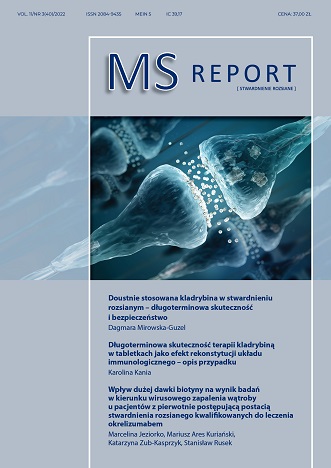Doustnie stosowana kladrybina w stwardnieniu rozsianym – długoterminowa skuteczność i bezpieczeństwo Artykuł przeglądowy
##plugins.themes.bootstrap3.article.main##
Abstrakt
Kladrybina podawana doustnie została zarejestrowana do leczenia rzutowej postaci stwardnienia rozsianego o dużej aktywności, potwierdzonej objawami klinicznymi lub wynikami diagnostyki obrazowej przeprowadzonej metodą rezonansu magnetycznego. Zgodnie z zapisami rejestracyjnymi przewiduje się stosowanie leku przez 2 lata w ściśle określonym schemacie niewymagającym powtarzania dawek w 3. i 4. roku terapii. Jednocześnie, biorąc pod uwagę wieloletni przebieg choroby oraz dane z rzeczywistej praktyki klinicznej, wiemy, że u części pacjentów występuje konieczność rozważenia ponownego podawania kladrybiny. W artykule wskazano różne wzorce odpowiedzi na terapię kladrybiną, omówiono czynniki, które mogą determinować długoletnią skuteczność i bezpieczeństwo leku, oraz przedstawiono bieżącą wiedzę na temat odległych efektów jego stosowania i nowe doniesienia z zakresu nadzoru nad bezpieczeństwem farmakoterapii.
##plugins.themes.bootstrap3.article.details##
Copyright © by Medical Education. All rights reserved.
Bibliografia
2. Programy lekowe w chorobach nieonkologicznych (Leczenie chorych na stwardnienie rozsiane (B29) (access: 10.11.2022).
3. Mavenclad® – charakterystyka produktu leczniczego (access: 10.11.2022).
4. Leis TP, Weissert R. Cladribine: mode of action and implications for treatment of multiple sclerosis. Clin Neuropharmacol. 2011; 34: 28-35.
5. Ceronie B, Jacobs BM, Baker D et al. Cladribine treatment of multiple sclerosis is associated with depletion of memory B cells. J Neurol. 2018; 265(5): 1199-209. http://doi.org/10.1007/s00415-018-8830-y.
6. Baker D, Herrod SS, Alvarez-Gonzalez C et al. Both cladribine and alemtuzumab may effect MS via B-cell depletion. Neurol Neuroimmunol Neuroinflamm. 2017; 4: e360.
7. Hermann R, Karlsson MO, Novakovic AM et al. The clinical pharmacology of cladribine tablets for the treatment of relapsing-remitting multiple sclerosis. Clin Pharmacokinet. 2019; 58(3): 283-97.
8. Moreau T, Coles A, Wing M et al. Transient increase in symptoms associated with cytokine release in patients with multiple sclerosis. Brain. 1996; 119: 225-37.
9. Cohen JA, Coles AJ, Arnold DL et al. Alemtuzumab versus interferon-beta-1a as first line treatment for patients. Lancet. 2012; 380: 1819-28.
10. Hauser SL, Bar-Or A, Comi G et al. Ocrelizumab versus interferon-beta-1a in relapsing-remitting multiple sclerosis. N Engl J Med. 2017; 376: 221-34.
11. Rolfes L, Pfeuffer S, Hauntemann N et al. Immunological consequences of cladribine treatment in multiple sclerosis: a real-world study. Mult Scler Relat Dis. 2022; 64: 103931.
12. Baker D, Pryce G, Herrod SS et al. Potential mechanism of action related to the efficacy and safety of cladribine. Mult Scler Relat Disord. 2019; 30: 176-86.
13. Comi G, Cook SD, Rammohan P et al. Long-term effects of cladribine tablets on MRI activity outcomes in patients with relapsing-remitting multiple sclerosis. The CLARITY extension study. Ther Adv Neurol Disord. 2018; 11: 1756285617753365.
14. Giovannoni G, Sorensen SP, Cook S et al. Safety and efficacy of cladribine tablets in patients with relapsing-remitting multiple sclerosis: results from the randomized extension trial of the CLARITY study. Mult Scler. 2018; 24: 1594-604.
15. Giovannoni G, Comi G, Rammohan K et al. Long-term disease stability assessed by the expanded disability status scale in patients treated with cladribine tablets 3,5 mg/kg for relapsing multiple sclerosis: an exploratory post hoc analysis of the CLARITY and CLARITY extension studies. Adv Ther. 2021; 38: 4975-85.
16. Giovannoni G, Singer BA, Issard D et al. Durability of no evidence disease activity-3 (NEDA-3 in patients receiving cladribine tablets: the CLARITY extension study. Mult Scler J. 2021. http://doi.org/10.1177/13524585211049392.
17. Patti F, Visconti A, Capacchione A et al; CLARINET-MS Study Group. Long-term effectiveness in patients previously treated with cladribine tablets: a real-world analysis of the Italian multiple sclerosis registry (CLARINET-MS). Ther Adv Neurol Disord. 2020; 13: 1756286420922685.
18. Meuth SG, Bayas A, Kallmann B et al. Long-term management of multiple sclerosis patients treated with cladribine tablets: an expert opinion. Exp Opin Pharmacother. 2020; 21(16): 1965-9.
19. Meuth SG, Bayas A, Kallmann B et al. Long-term management of multiple sclerosis patients treated with cladribine tablets beyond year 4. Exp Opin Pharmacother. 2022. http://doi.org/10.1080/14656566.2022.2106783.
20. Meca-Lallana V, Dominiguez Garcia JM, Lopez Riuz R et al. Expert-agreed practical recommendation on the use of cladribine. Neurol Ther. 2022; 11(4): 1475-88. http://doi.org/10.1007/s40120-022-00394-0.
21. Petracca M, Ruggieri S, Barbuti E et al. Predictors of cladribine effectiveness and safety in multiple sclerosis: a real-world, multicenter, 2-year follow-up study. Neurol Ther. 2022; 11(3): 1193-208. http://doi.org/10.1007/s40120-022-00364-6.
22. Giovannoni G, Sorensen SP, Cook S et al. Efficacy of Cladribine Tablets in high disease activity subgroups of patients with relapsing multiple sclerosis: A post hoc analysis of the CLARITY study. Mult Scler. 2019; 25(6): 819-27.
23. Giovannoni G, Sorensen SP, Cook S et al. Safety and efficacy of cladribine tablets in patients with relapsing-remitting multiple sclerosis: results from the randomized extension trial of the CLARITY study. Mult Scler. 2018; 24: 1594-604.
24. Zanghi A, Gallo A, Avolio C et al. Exit strategies in natalizumab-treated RRMS at high risk of progressive multifocal leukoencephalopathy: a multicenter comparison study. Neurotherapeutics. 2021; 18: 1166-74.
25. Pfeuffer S, Rolfes L, Hackert J et al. Effectiveness and safety of cladribine in MS: real-world experience from two tertiary centres. Mult Scler. 2022; 28: 257-68. http://doi.org/10.1177/13524585211012227.
26. Freeman L, Longbrake EE, Coyle PK et al. High-efficacy therapies for treatment-naïve individuals with relapsing-remitting multiple sclerosis. CNS Drugs. 2022; 36: 1285-99. http://doi.org/10.1177/s40263-022-00965-7.
27. Pakpoor J, Disanto G, Altmann DR et al. No evidence for higher risk of cancer in patients with multiple sclerosis taking cladribine. Neurol Neuroimmunol Neuroinflamm. 2015; 2: e158.
28. Leist T, Cook S, Comi G et al. Long-term safety data from cladribine tablets clinical development program in multiple sclerosis. Mult Scler Relat Disord. 2020; 46: 102572.
29. Komunikat do fachowych pracowników ochrony zdrowia dotyczący ryzyka uszkodzenia wątroby u chorych leczonych kladrybiną (access: 10.11.2022).
30. Rolfes L, Pfeuffer S, Hackert J et al. Skin reactions in patients with multiple sclerosis receiving cladribine treatment. Neurol Neuroimmunol Neuroinflamm. 2021; 8(3): e990. http://doi.org/10.1212/NXL0000000000000990.

